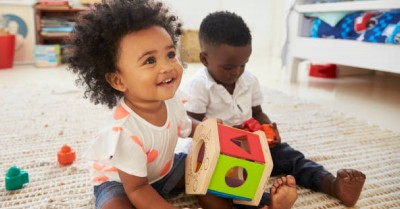Inquiry-based learning is an experiential educational approach in which learners are encouraged to explore, question and arrive at their own conclusions. Asking questions is an important aspect of an inquiry-based approach but toddlers and very young children may not have the language to frame and ask such questions. Here are then a few tips on planning inquiry-based experiences for toddlers.
Set Up The Physical Environment
When planning inquiry-based learning experiences for toddlers, ensure the physical environment has ample natural light and space for movement. The young learners should not feel hedged in physically or psychologically with adult carers expecting them to ask questions and start ‘playing’ right away. Children should be given enough time and space to observe, explore and wonder before they are ready to directly engage with any aspect of their environment.
Open-ended Play Material
In order to stimulate their inquiry processes, give toddlers access to open-ended play resources. See that these are tactile and varied so that they can use their senses to play and investigate them. Use objects that can be grasped and have the potential for activities such as squeezing and rolling such as balls of different sizes, pipes, tubes, boxes, beanbags, bottle lids, cardboard, paper towel rolls, blocks and sponge blocks. Include loose parts like beads, sticks, ribbons, stones and rings that facilitate open-ended play. The other kind of unstructured play materials is those that help children explore different textures like wood, yarn, clay, chalk, string, fabric, scarves, board, foam, scented playdough, mint and herbs as well as colours for finger and feet painting. Toddlers are especially fascinated with mirrors as they get to explore reflection, symmetry, angles, movement and self-awareness. Natural materials are inherently unstructured and can offer hours of delightful creative play with objects like leaves, nuts, bark, sticks, pebbles, mud, clay, sand and water. However, be careful of choking hazards when giving toddlers access to loose parts and small play objects.
Watch For Learning Opportunities
Observe as the toddler engages with play materials spontaneously or if you need to introduce the object to the child. As the child plays with the objects, describe the actions with appropriate words, like “I see you turning/ mouthing/ dropping/looking at/feeling the object” and then offer a descriptive vocabulary for the object that notes its colours, textures and other appropriate features like, ‘heavy’, ‘light’, ‘cool’ and so on. For inquiry-based learning with toddlers, it is important to watch out for non-verbal cues that give evidence of their investigation – for example, turning objects round and round in their hands, knocking two objects together, throwing it across the room and so on.
Engage With The Learners
Once the toddler is fully engaged, you can ask how the material feels in their hands, on their skin or in their mouths. Questions like these not only model the thinking process for young learners but motivate them to investigate deeper, like whether two materials with different textures like sand and rubber block might have different consequences when dropped from a table or dunked in water. Support such attempts by your learners by verbally reflecting on their observations so that they know to make connections between different ideas. Eventually, show them how to look for answers through simple experiments or by reading books together. Finally encourage toddlers to reflect on their activity and observations with questions like “What did we find when we poured sand into the water?” or “Which object in this tray did you like best and why”.
References:
- Inquiry Learning, Departement Of Education Queensland
- How to Support Inquiry Thinking in Preschool, Preschool Stream







 As an Educator in Australia, your pay rate falls under the Children’s Services Award 2010. This award states the minimum amount that an employer can
As an Educator in Australia, your pay rate falls under the Children’s Services Award 2010. This award states the minimum amount that an employer can When working as a qualified Early Childhood Teacher (with a university degree) within a service, your rate of pay will come from the Educational Services
When working as a qualified Early Childhood Teacher (with a university degree) within a service, your rate of pay will come from the Educational Services When working as a Diploma Qualified Educator your pay rate is from the Children's Services Award 2010. This Award states your minimum rate of pay
When working as a Diploma Qualified Educator your pay rate is from the Children's Services Award 2010. This Award states your minimum rate of pay When working as a Cert 3 Qualified Educator, your pay rate is from the Children's Services Award 2010. This Award states your minimum rate of
When working as a Cert 3 Qualified Educator, your pay rate is from the Children's Services Award 2010. This Award states your minimum rate of Educational Leaders play a crucial role in their early childhood service by ensuring that the educational program aligns with best practices and supports the holistic
Educational Leaders play a crucial role in their early childhood service by ensuring that the educational program aligns with best practices and supports the holistic In early childhood education and care, ratios are more than a technicality—they are a frontline safeguard. Every child deserves responsive supervision, emotional connection, and developmental
In early childhood education and care, ratios are more than a technicality—they are a frontline safeguard. Every child deserves responsive supervision, emotional connection, and developmental With the new national child safety reforms kicking in on 1 September 2025, early childhood services like yours have a real opportunity to lead the
With the new national child safety reforms kicking in on 1 September 2025, early childhood services like yours have a real opportunity to lead the Here’s a comprehensive Mobile Phone and Smart Watch Policy tailored for early childhood education and care (ECEC) services in Australia, aligned with the latest 2025
Here’s a comprehensive Mobile Phone and Smart Watch Policy tailored for early childhood education and care (ECEC) services in Australia, aligned with the latest 2025 The Sea of Fish Challenge is a national initiative that invites children, educators, families, and communities to create and display fish artworks as a symbol
The Sea of Fish Challenge is a national initiative that invites children, educators, families, and communities to create and display fish artworks as a symbol Across the early childhood education and care sector, educators are sounding the alarm: current staffing ratios are insufficient to deliver safe, meaningful, and developmentally appropriate
Across the early childhood education and care sector, educators are sounding the alarm: current staffing ratios are insufficient to deliver safe, meaningful, and developmentally appropriate


